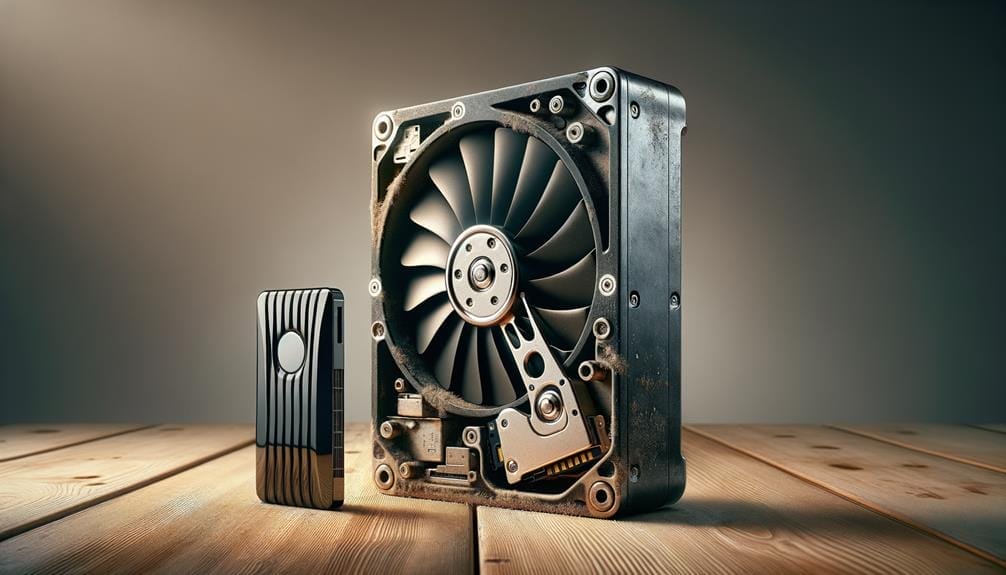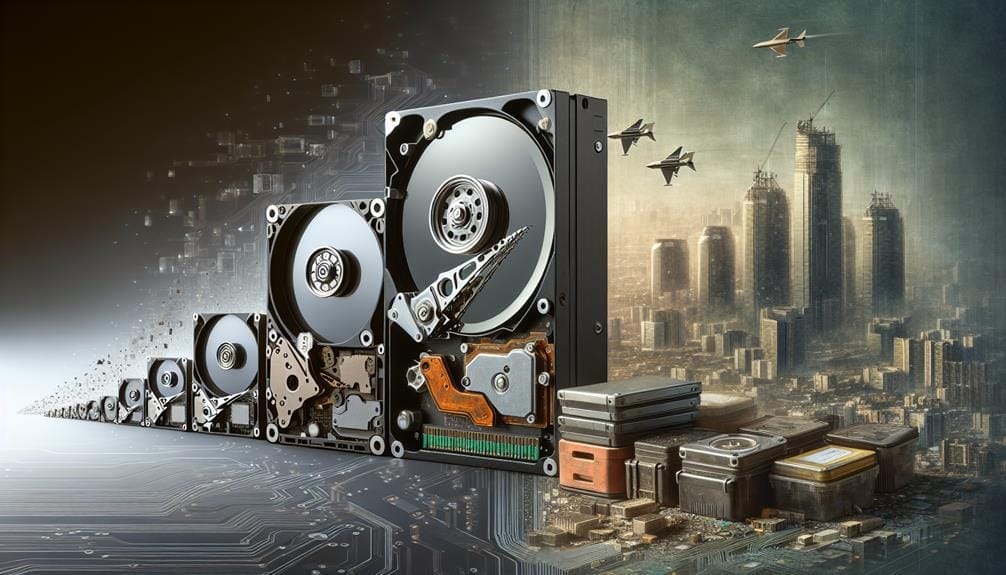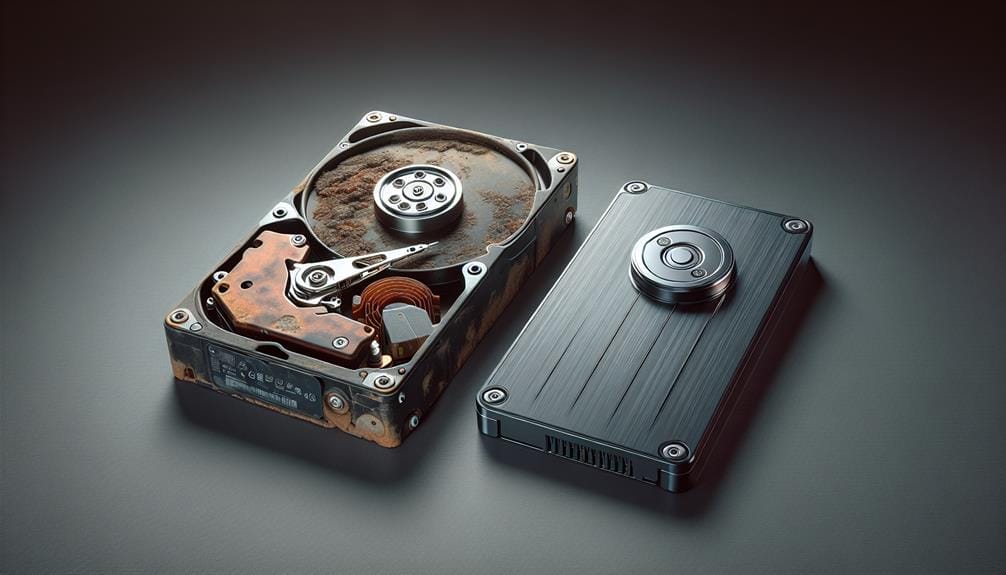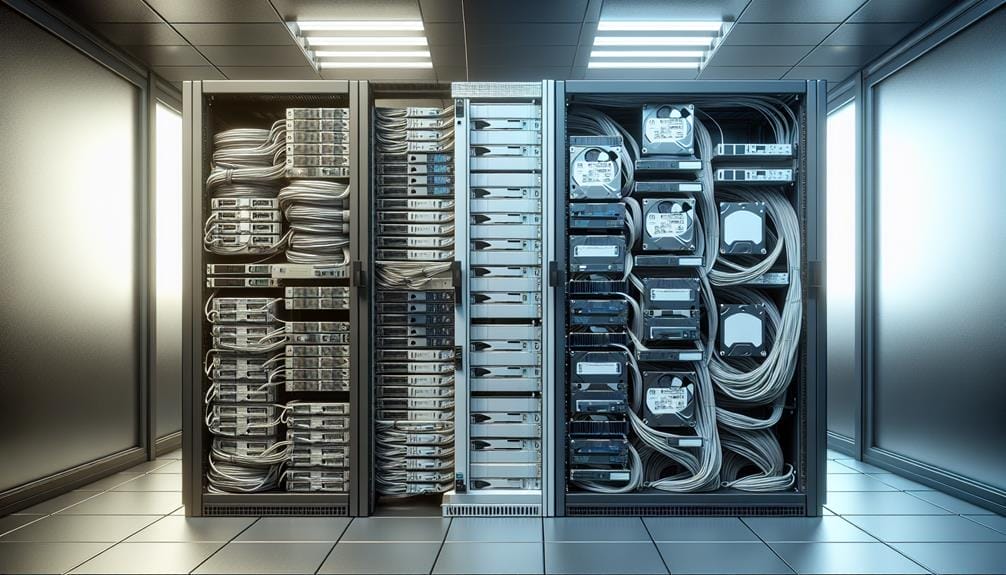HDDs: Facing Obsolescence in Tech's New Era

As the tech industry rapidly progresses, the conventional function of hard disk drives (HDDs) is progressively coming under threat from the rise of solid-state drives (SSDs).
This shift has ignited a discourse on the future relevance of HDDs in the rapidly evolving landscape of data storage. With the increasing prominence of SSD technology, the once unassailable position of HDDs is now being called into question.
This discussion seeks to dissect the implications of this technological revolution and unravel the potential obsolescence of HDDs in the face of SSD dominance.
Key Takeaways
- HDDs are one of the oldest and longest-lasting PC storage standards.
- SSDs offer significantly faster speeds and are more durable compared to HDDs.
- HDDs perform poorly compared to SSDs in general use, especially as boot drives.
- HDDs are still suitable for media consumption and cost-effective for storing large media libraries.
Evolution of Data Storage Technology

The evolution of data storage technology has been marked by a significant shift from traditional hard disk drives (HDDs) to solid-state drives (SSDs) in response to the increasing demand for faster and more reliable storage solutions.
This transition has had a profound impact on the industry, leading to the dominance of SSDs in the market. The advantages of SSDs over HDDs, such as faster speeds, improved durability, and efficient use of SATA and NVMe technologies, have rendered HDDs less suitable for general use, especially as boot drives.
While HDDs still find utility in high-capacity media storage and specific applications like gaming, video editing, and 3D rendering, the ongoing advancements in SSD technology continue to reinforce their dominance and signal the potential obsolescence of HDDs in various computing environments.
Performance Comparison: HDDs Vs. SSDs
As technology continues to advance, the performance disparity between HDDs and SSDs has become increasingly evident.
- SSDs offer significantly faster read and write speeds compared to HDDs.
- The pricing of SSDs has become more competitive, making them a viable alternative to HDDs.
- SSDs have a longer lifespan than HDDs due to their lack of moving parts, resulting in lower chances of mechanical failure.
- The decreasing cost of SSDs has made them more accessible for consumers, further challenging the relevance of HDDs.
This performance comparison highlights the clear advantages of SSDs over HDDs in terms of speed, pricing, and lifespan, solidifying their position as the preferred storage solution in the evolving landscape of technology.
Obsolete Role of HDDs in Boot Drives

Gradually, the role of HDDs as boot drives is becoming obsolete in the rapidly evolving landscape of technology. The slow boot times of HDDs, often taking several minutes, are no longer acceptable in a world where speed is paramount. SSDs, on the other hand, boot in under 30 seconds, offering a significantly faster start-up experience. To emphasize the contrast, the table below illustrates the boot time comparison between HDDs and SSDs, along with the benefits of fast boot and effective page file management.
| Boot Drive Type | Boot Time | Advantages of Fast Boot | Benefits of Page File Management |
|---|---|---|---|
| HDD | Minutes | Reduced waiting time | Improved system responsiveness |
| SSD | Seconds | Quick access to system | Optimal virtual memory settings |
As technology continues to advance, the superior performance of SSDs in boot drives makes HDDs increasingly obsolete.
HDDs: Media Storage and Consumption
In light of the diminishing role of HDDs as boot drives due to their slow boot times, it is pertinent to explore their continued relevance in the realm of media storage and consumption.
- HDDs are cost-effective for storing large media libraries.
- HDDs offer high-capacity storage for media files.
- Streaming media from an HDD does not require the same speed as booting an operating system.
- While SSDs may offer faster media loading times, HDDs are still viable for media consumption, especially considering their cost-effectiveness.
This shift in focus from boot drives to media storage and consumption highlights the adaptability of HDDs in the face of technological advancements, particularly in the context of large-scale media libraries and streaming applications.
HDDs in Specific Applications

HDDs remain a common choice for storing large game libraries and infrequently accessed data, despite the growing dominance of SSDs in the realm of specific applications such as gaming, video editing, and 3D rendering.
In gaming, while SSDs provide faster load times and better gaming performance, HDDs continue to be popular due to their cost-effectiveness and ability to store large game libraries.
However, for video editing, HDDs have limitations due to slower read and write speeds, impacting the efficiency of editing workflows.
Similarly, in 3D rendering, while HDDs technically work, they are not ideal as they can significantly slow down rendering times.
Therefore, while HDDs still have a place in specific applications, the limitations in video editing and 3D rendering highlight the growing importance and benefits of SSDs in these areas.
Impact of SSD Dominance on HDDs
The growing prevalence of SSDs in specific applications, such as gaming, video editing, and 3D rendering, has initiated a paradigm shift in the storage landscape, significantly impacting the relevance and utilization of traditional HDDs.
This shift has several implications:
- Impact of SSD Pricing on HDD Market: The declining prices of SSDs have made them more accessible, increasing their market share at the expense of HDDs.
- SSD Reliability vs HDD Durability: SSDs are known for their reliability due to no moving parts, while HDDs are valued for their durability in terms of long-term usage.
The impact of SSD dominance on HDDs is further underscored by these factors, indicating a clear trend towards SSD adoption in various computing applications.
HDD Obsolescence: Industry Feedback
Amidst the evolving landscape of technology, industry feedback underscores the growing consensus regarding the obsolescence of traditional hard disk drives (HDDs).
Feedback from industry experts emphasizes concerns about HDD reliability and lifespan. The general sentiment suggests that HDDs, with their mechanical components, are prone to failure and have a limited lifespan compared to solid-state drives (SSDs).
This feedback is supported by data showing that HDD failure rates tend to increase significantly after three years of use.
Industry professionals are increasingly advocating for the transition to SSDs due to their superior reliability and longer lifespan, indicating a shift away from HDDs in favor of more advanced storage solutions.
Future of HDDs in New Tech Era
In the rapidly evolving landscape of technology, the future of traditional hard disk drives (HDDs) is facing unprecedented challenges as solid-state drives (SSDs) continue to dominate the storage solutions market. As technology advances, the future of HDDs is influenced by several key factors:
- Future of HDDs in Gaming: HDDs are increasingly being replaced by SSDs in gaming due to their faster loading times and improved gaming experience.
- HDDs in Data Centers: While data centers have traditionally relied on HDDs for their large storage capacities, the trend is shifting towards SSDs for their enhanced performance and reliability.
- Technological Advancements: The continuous development of SSD technology poses a significant threat to the future relevance of HDDs in various applications.
- Adaptation in the Market: HDD manufacturers are facing the challenge of adapting to the changing market demands and technological advancements.
The future of HDDs in gaming and data centers is at a crossroads as SSDs continue to gain prominence.
Conclusion
In conclusion, the rapid advancements in solid-state drive (SSD) technology have led to a shifting paradigm in the storage solutions landscape, raising questions about the future relevance of hard disk drives (HDDs).
The performance comparison, obsolete role of HDDs in boot drives, their relevance in media consumption, and suitability for specific applications all point towards the potential obsolescence of HDDs in the tech industry.
The impact of SSD dominance on HDDs and industry feedback further highlight the need to reevaluate the role of HDDs in the new tech era.

